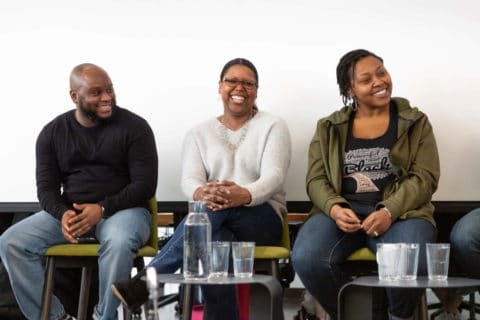Learning from our LGBTQIA+ colleagues during Pride Month
Four impactful takeaways from our LGBTQIA+ panel discussion at Haven Life.

“Pride Month is about having fun and celebrating,” says Haven Life product owner Gabe Diaz. “But it’s also about recognizing historical and current suffering and pain within the LGBTQ community.” That dichotomy — between celebration and mourning, between joy and suffering — defined our recent (virtual) panel for Pride Month, where the company’s LGBTQIA+ staff could share their experiences both inside and outside Haven Life. The conversation was compelling and personal, so much so that we wanted to share what was discussed, given how useful it is beyond the walls of our HQ.
In this article:
On cultural differences
Haven Life has a very international workforce, so it’s particularly important to be conscious of how the experience of being LGBTQ can vary depending on where you’re from. Lester Echem, a full-stack engineer from the Philippines said, “When I came out to my parents they asked if I wanted to become female and were shocked when I said, ‘No.’” Lester considers that way of thinking to be common “for a lot of cultures that are not exposed to American media. It was really hard for them to accept who I was because they couldn’t understand how I would live my life.”
In contrast, Lester has been met with a lot of understanding at Haven Life. “When I tell my co-workers that I have a husband who is Indian, their first comment isn’t ‘I didn’t know you were gay,’ it’s ‘How is your husband? Is he OK coming out to his family?’ so there’s care, there’s concern, there’s acceptance. And I love that.” Also, Lester said, for people who may not be able to interact with their families often because of their sexuality, a place like Haven Life, which has a lot of events outside of the office, can be a great source of support. “There are trips upstate, eating at [employees’] homes and other activities, and my husband is included in all of that, which is a breath of fresh air.”
Lester said that for his colleagues, “My request to you is to please check in on [LGBTQ] people, especially immigrants who go back to their country, often,” and might be struggling with how their sexual orientation affects things with their families. “You all are in a unique position to help by providing a space in which they’re able to be themselves,” said Lester. “You might save a life. That feeling that you’re able to be accepted by other people makes you accept yourself. It’s really hard for us to accept ourselves by ourselves. I started finding acceptance when I told somebody about myself and they accepted me.”
“My request to you is to please check in on [LGBTQ] people often. You are in a unique position to help by providing a space in which they’re able to be themselves.”
—- Lester Echem, full-stack engineer
On (repeatedly) coming out
Mark Sayre, head of risk solutions, began his contribution by sharing a “non coming-out story” about visiting a butcher in Italy who assumed that Mark, as an American male, would have strong, favorable opinions about the beauty of the local women. Said Mark, “I tried to learn the names of the meats [in Italian] before I went to the store, but I hadn’t prepared myself to manage a coming-out moment with an Italian butcher.” So he felt obliged to play along, making some generic, appreciative comments about the area’s female population. “The reason I share that story,” he said, is to show that “coming out isn’t something you do once and everyone knows. It’s actually a decision you have to make sometimes multiple times per day, and every time you make that decision you’re assessing a lot of factors, including the safety of the environment you’re in, the potential reaction of the people you’re with and your own level of emotional availability. It can be emotionally draining to navigate these things on a regular basis – sometimes I just want to buy a coffee and don’t want it to be a coming out moment.”
On pronouns and gender identity
Mark also mentioned that his story ties in with the fact that “for some people, being LGBTQ is to be part of an invisible minority, which is a source of privilege that other minorities do not have.” That privilege is called “passing”. It enables a marginalized person to pass as a member of a more privileged, non-marginalized group to protect themselves or gain advantages they would otherwise not be able to access. Technical writer Sam Brandt picked up the theme, mentioning that there are many LGBTQ people who can’t pass and don’t care if they do. Sam, whose pronouns are “they/them” says, “I feel like I look trans and I love looking trans.” Sam adds that “I’ve got no choice; I have to come out just to get people to use my correct pronouns. Being non-binary means every day out in the world there’s the challenge of when to correct people on my pronouns, how often to do it, how to do it so people get the idea but don’t get annoyed at me, how much to get into it…”
Sam also offered a simple explanation of what being trans is. “When you’re born, the doctor takes a look at your parts and says ’This is a boy,’ or ’This is a girl.’ When you’re trans, you disagree with that assessment. When you’re cisgender or ‘cis’, you agree with it. We also talk about binary and non-binary trans. Binary trans means that you identify as male or female. ‘Non-binary’ means you identify outside of that dichotomy.” For Sam, who is non-binary, being misgendered by people is “like a paper cut. I have to expect people to get it wrong, which means I have to expect a certain amount of paper cuts per day, so the amount that I can lessen that each day is obviously good. Which is why it’s good to be at a place like Haven Life, where I can be more fully myself.”
For Sam, who is non-binary, being misgendered by people is “like a paper cut. I have to expect people to get it wrong, which means I have to expect a certain amount of paper cuts per day.”
On advice for allies
The panelists had more suggestions for straight or cis people who want to be allies. Said Gabe Diaz, “It’s totally OK to make mistakes. We want you to engage with us, to talk to us about pronouns, about gender, about sexual orientation. We also want folks to not make assumptions about their colleagues. Share what you learn at work and at home. If you spread awareness and your own acceptance of us, that makes the world a little bit safer for everyone who is different.”
Developer Anja Draskovic also made an important point about support: “If you’re going to be an advocate or an ally, it’s not for the duration of a Twitter trend, a news cycle, or a month. It’s a lifelong commitment.” Regarding the forms that commitment might take, she said, “You may not be able to donate or protest, but you do have the ability to vote. If you want to be there for people in times of inequality or injustice, go tell your representative that.”
Our editorial policy
Haven Life is a customer-centric life insurance agency that’s backed and wholly owned by Massachusetts Mutual Life Insurance Company (MassMutual). We believe navigating decisions about life insurance, your personal finances and overall wellness can be refreshingly simple.
Our editorial policy
Haven Life is a customer centric life insurance agency that’s backed and wholly owned by Massachusetts Mutual Life Insurance Company (MassMutual). We believe navigating decisions about life insurance, your personal finances and overall wellness can be refreshingly simple.
Our content is created for educational purposes only. Haven Life does not endorse the companies, products, services or strategies discussed here, but we hope they can make your life a little less hard if they are a fit for your situation.
Haven Life is not authorized to give tax, legal or investment advice. This material is not intended to provide, and should not be relied on for tax, legal, or investment advice. Individuals are encouraged to seed advice from their own tax or legal counsel.
Our disclosures
Haven Term is a Term Life Insurance Policy (DTC and ICC17DTC in certain states, including NC) issued by Massachusetts Mutual Life Insurance Company (MassMutual), Springfield, MA 01111-0001 and offered exclusively through Haven Life Insurance Agency, LLC. In NY, Haven Term is DTC-NY 1017. In CA, Haven Term is DTC-CA 042017. Haven Term Simplified is a Simplified Issue Term Life Insurance Policy (ICC19PCM-SI 0819 in certain states, including NC) issued by the C.M. Life Insurance Company, Enfield, CT 06082. Policy and rider form numbers and features may vary by state and may not be available in all states. Our Agency license number in California is OK71922 and in Arkansas 100139527.
MassMutual is rated by A.M. Best Company as A++ (Superior; Top category of 15). The rating is as of Aril 1, 2020 and is subject to change. MassMutual has received different ratings from other rating agencies.
Haven Life Plus (Plus) is the marketing name for the Plus rider, which is included as part of the Haven Term policy and offers access to additional services and benefits at no cost or at a discount. The rider is not available in every state and is subject to change at any time. Neither Haven Life nor MassMutual are responsible for the provision of the benefits and services made accessible under the Plus Rider, which are provided by third party vendors (partners). For more information about Haven Life Plus, please visit: https://havenlife.com/plus




